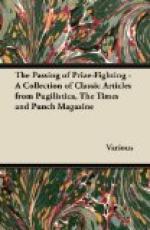* * * * *
The Pagan (METHUEN) certainly deserves to be called one of the uncommon stories. Whether it will be a popular success is of course a different matter. At least it confirms my previous suspicion, that Mr. CHARLES INGE is a novelist who takes his art seriously and is not afraid of originality. The moral of his tale, which perhaps hardly needs much enforcing to-day, is—don’t be too much impressed with the idea of the superman, and especially don’t try to go one better. That was the attempt that broke up the happy home where John Witherson had lived with his wife, his infant son and his mother and sister-in-law (too many; but that is beside the point). John had been a schoolmaster, old style, teaching in the ancient faiths, muscular Christianity, play-the-game, sportsmanship and the rest. But about half-way through the War the apparent invincibility of brutal force began to rattle John’s nerves. It rattled them so much that he eventually sold his school, moved his household, including the in-laws, to Suburbia, and set up, in partnership with two others of like mind, as instructor of youth, after the jungle law of ruthless efficiency. Not content with this, he proposed also to turn the infant Witherson into a prospective superman by giving him toy-tigers and brief lectures on the rewards of frightfulness. Whereat the mother, finding her protests disregarded, dried her eyes and set herself to fill the poor child’s infrequent leisure with anti-toxin injections of the higher morality as conveyed in the poetry of TENNYSON. You now take my meaning when I speak of Mr. INGE as sufficiently single-minded to brave some danger of unintentional humour. Really my sketch has done less than justice to a story that will hold your interest, if only for the sincerity with which it is handled; for myself I was first impatient, then derisive, finally curious to know how it was going to end. I rather think this sounds like a victory for Mr. INGE.
* * * * *
It will add a new terror to the Peace if everybody who has done A Year of Public Life (CONSTABLE) in or about Whitehall is to make a book about it. Not that Mrs. C.S. PEEL does not deserve well of her country. She is evidently a capable person and hustled about the country for the Ministry of Food to some purpose before the days of compulsory rationing. Her general idea seems to be that simple folk are tremendously interested in the most trivial and indirect details of important folk. So she will tell you how Sir HENRY REW and Mr. ULICK WINTOUR were fond of tea (Sir HENRY liked a bun as well); how Mr. KENNEDY JONES once lent her his car; how Lord DEVONPORT, asked if biscuits were included in the voluntary cereal ration, said firmly, “Yes, they are”; how the chauffeur suddenly put on the brake and she bumped into “poor M. FAIDIDES”; how she “visited Bath twice and bought a guide-book,”




